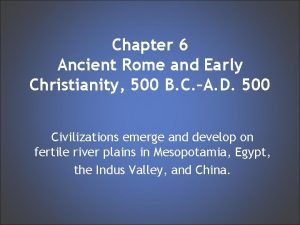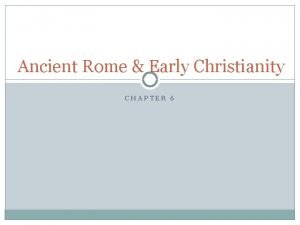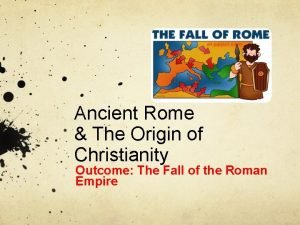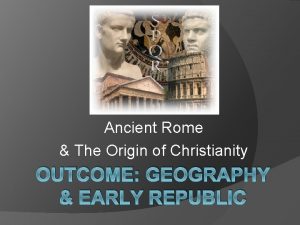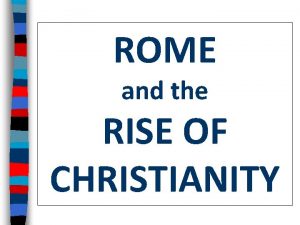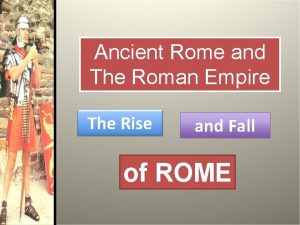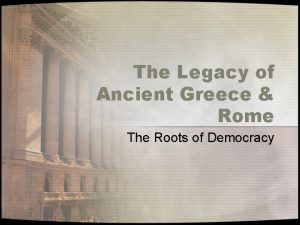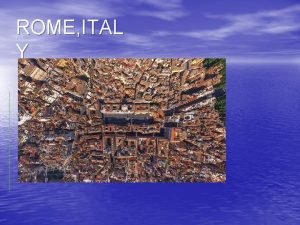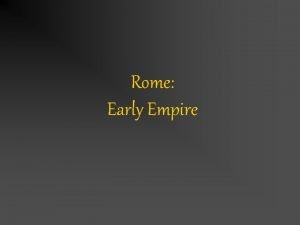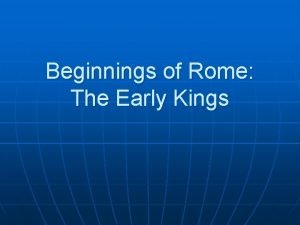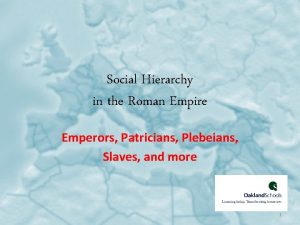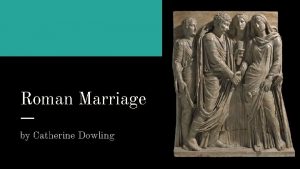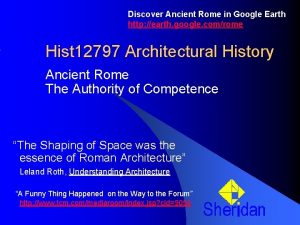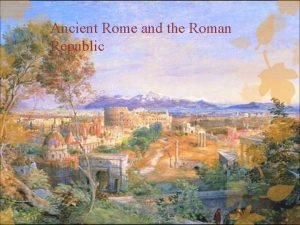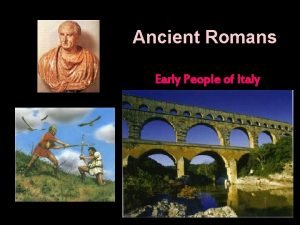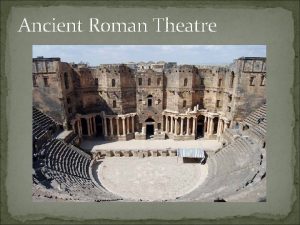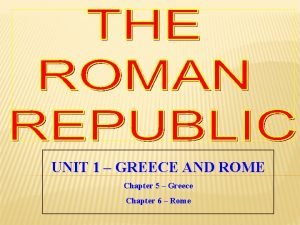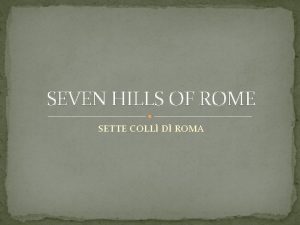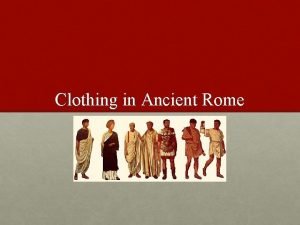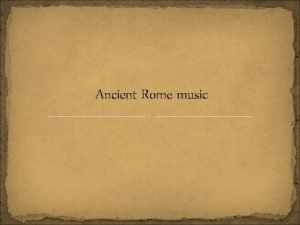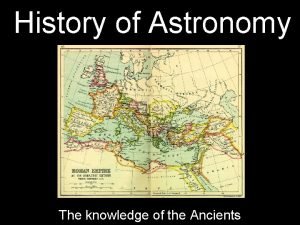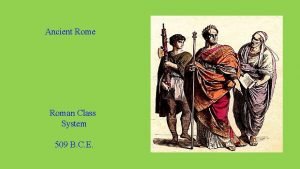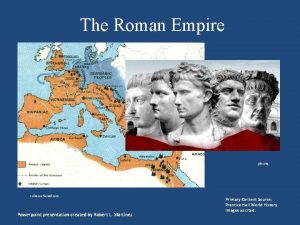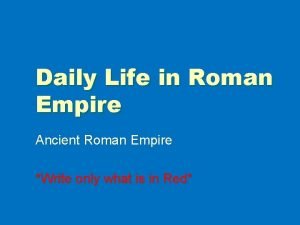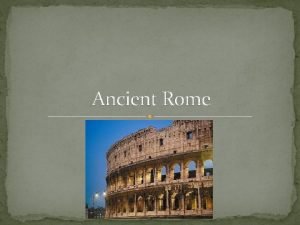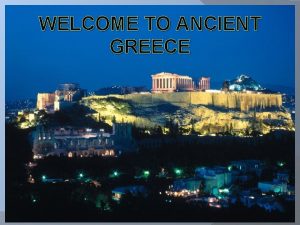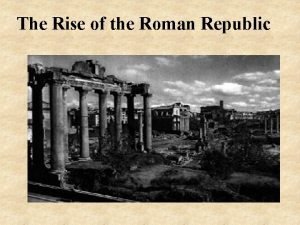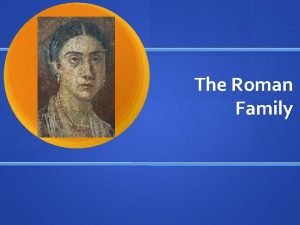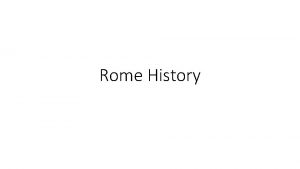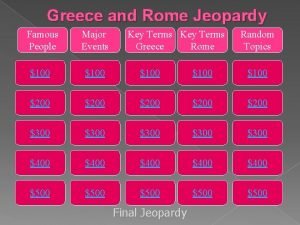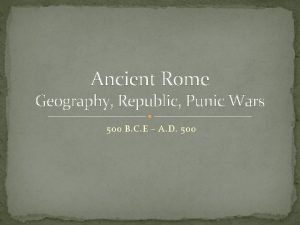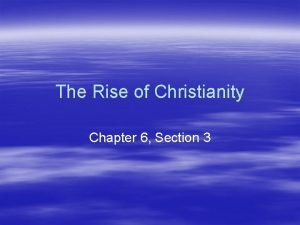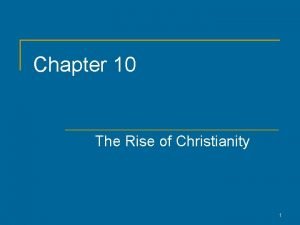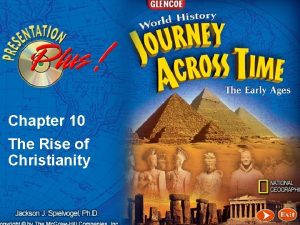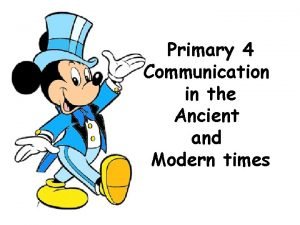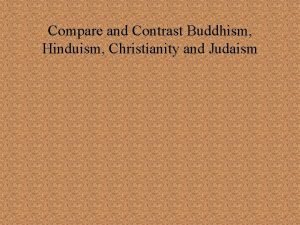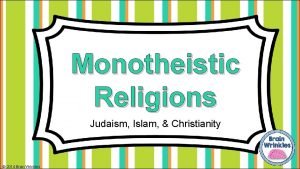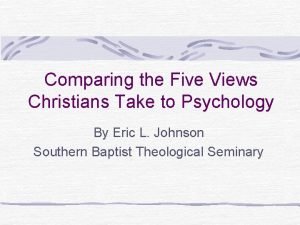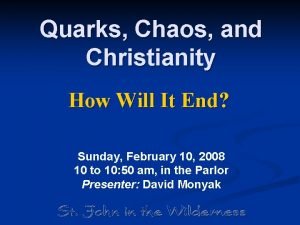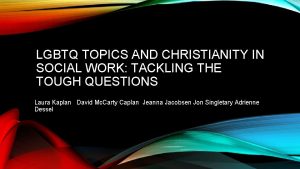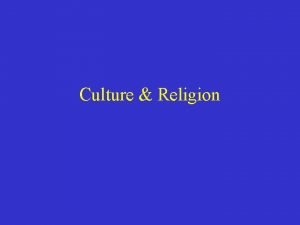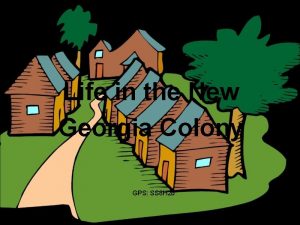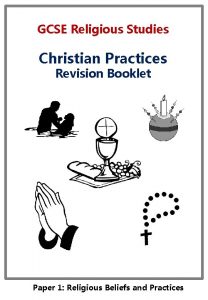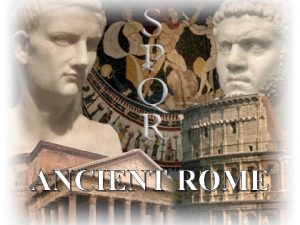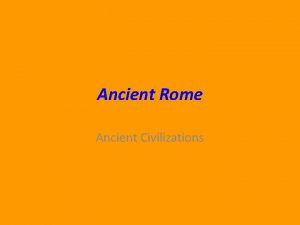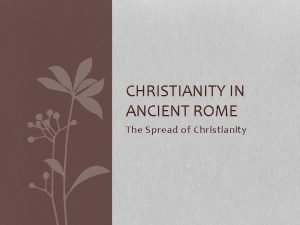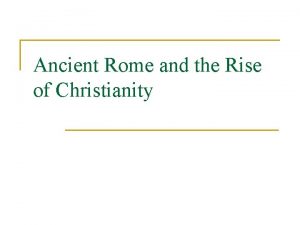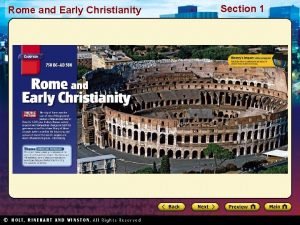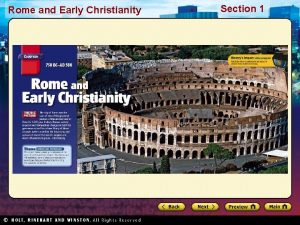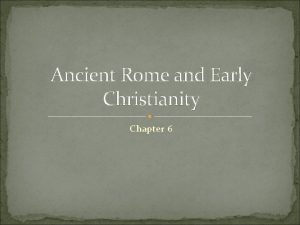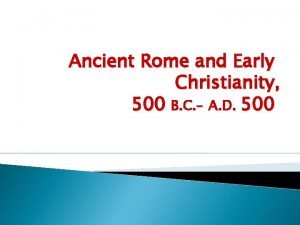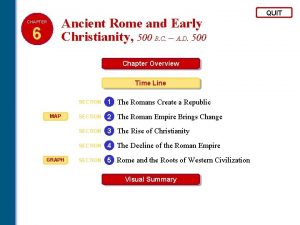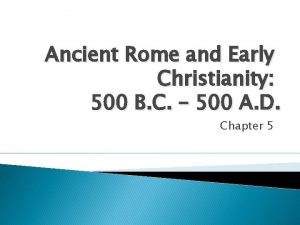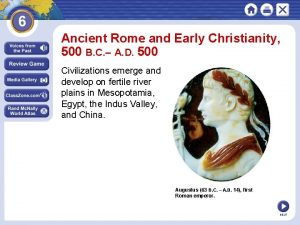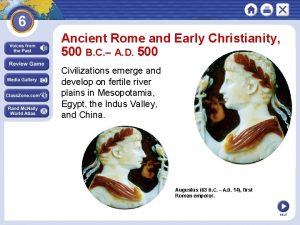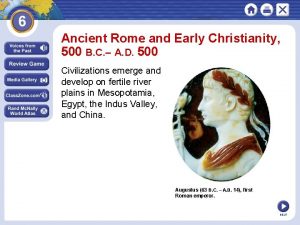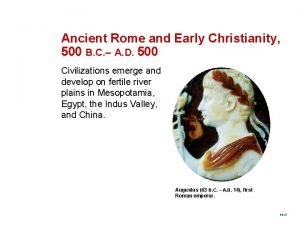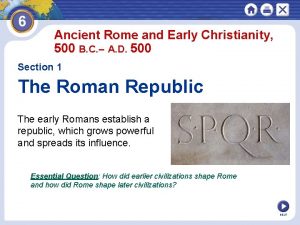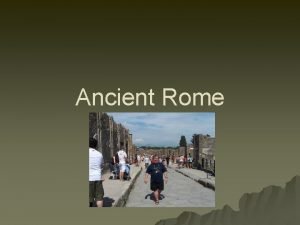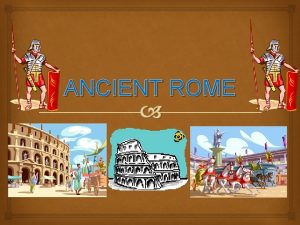Ancient Rome and Early Christianity Chapter 6 The





































































- Slides: 69

Ancient Rome and Early Christianity Chapter 6

The Beginnings of Rome • Legend- 753 B. C. founded by Romulus and Remus, twin sons of god Mars and a Latin princess

The Beginnings of Rome • Culture evolved from the Latins, Greeks, and Etruscans

Roman Government • Began as monarchy- Etruscan Kings • 509 B. C. - Roman Aristocrats established a new government Republic – Democracy with representatives

Rome Spreads Its Power • By 265 BC, has conquered most of Italy-

Rome Spreads Its Power • Rome had different laws and rights for different territories • Those closest to Rome had more rights and power in government

Building The Empire • 218 BC

Building The Empire • 100 BC

Building The Empire • 44 BC- Death of Caesar

Building The Empire • AD 54 - Death of Claudius

Building The Empire • AD 116 Empire at its largest size • Trajan

Building The Empire • 275 AD • Death of Aurelian

Building The Empire • 305 AD • Abdication of Diocletion

Building The Empire • 450 AD • Empire at the time of Attila the Hun

Rome’s Commerce • 450 AD • Empire at the time of Attila the Hun

Roman Commerce • Great commercial empire • Access to land sea travel • Built roads with Rome as the central focus- “all roads lead to Rome”

Punic Wars • Carthage and Rome fought for control in the Mediterranean

Punic Wars • 264 -241 BCThree Wars • Hannibal. Military leader of Carthage

Punic Wars • Hannibal marched 50, 000 infantry, 9000 cavalry and 60 elephants over the Alps into Italy

Punic Wars • Roman General. Scipio defeated Hannibal in the Second Punic War • After third war, Rome controls the Mediterranean

Problems Resulting From Expansion • Widening gap between rich and poor> • corruption> • poverty • Class tensions-Poor became discontent

Civil War Erupts • 88 -82 BC • Rivals between generals during this period • Julius Caesar emerges to bring order to Rome

Civil War Erupts • Caesar, Crassus, and Pompey join forces • Caesar is elected consul in 59 BC • These three leaders rule as one--a“triumvirate”

Julius Caesar • Strong leader • Becomes governor of Gaulsuccessful in battle • Senate names him Emperor for life

Julius Caesar • Made many changessenate was threatened • Brutus and Cassius assassinate Caesar on March 15, 44 BC

Octavian (Caesar Augustus) • Claimed he would restore the Republic • Names himself “Augustus”“exalted one” • Stabilized the empire

Octavian • Built many buildings to glorify Rome • Established a “Civil Service” to run day to day operations

Later Emperors • Some were cruel- Caligula, Nero • “Five Good Emperors”(see page 150 + 151)

Roman Economy • Based on trade and farming • Common coinage • Trade within the empire as well as with India and China • Roads- “Silk Roads”

Life in Imperial Rome • Gods and goddesses were similar to Greeks • Religion and state were linked so gods represented government • Jupiter, Juno, Minerva

Life in Imperial Rome • Family was important • Slaves were important- most were conquered peoplegladiators • “Bread and Circuses”- given to distract and control the poor population

Life in Imperial Rome • Ancient Rome


Life in Imperial Rome • The Coliseum

Life in Imperial Rome • The Pantheon

Life in Imperial Rome • The Pantheon

Life in Imperial Rome • The Pantheon

Life in Imperial Rome • The Pantheon

Life in Imperial Rome • Baths of Trajan

Life in Imperial Rome

Life in Imperial Rome • Baths of Trajan

Life in Imperial Rome • Circus Maximus

Life in Imperial Rome • Circus Maximus

Life in Imperial Rome • Roman Dress

Life in Imperial Rome • Chariot

Pax Romana • 207 years of peace and prosperity- 27 BC to 180 AD • Also during this time Christianity develops

The Rise of Christianity • Judea(home of the Jews) became part of the empire around 63 BC

Life and Teachings of Jesus • Born in Bethlehem in Judea • Was a Jew and Roman subject • Carpenter

Jesus’ Message • Monotheistic- one God • God has a personal relationship to each person • Ten Commandments • “Love your neighbor”

Jesus’ Message • Disciples called “Apostles” • Large crowds came to hear him speak • Some people believed him to be the “messiah”- deliverer • More personal than other Roman gods

Jesus’ Death • Jesus visits Jerusalem • Romans mocked him- ‘King of the Jews” • Pontius Pilate- Roman Governor thought he was challenging the authority of Rome • Crucified

Christianity Spreads • Peter- original apostle who traveled to Syria and Palestine • Paul- “Saul”- convert who helped establish the early Christian churches • Message appealed to poor and slaves

Christian Persecution • Christians refused to worship Roman gods

Christian Persecution • Many were crucified, burned, killed by wild animals in circus arenas • “martyrs” for their faith

Christian Persecution • Emperor Galerius”Edict of Toleration 311 AD • Emperor Constantine’s Edict of Milanended persecution

Early Christian Church • Bishop- priest who supervised many local churches • Pope- father or head of the church

The Fathers of the Church • Augustine of Hippo • Wrote book. City of God • “The heavenly city can never be destroyed”

Decline of the Roman Empire • Rome’s economy declines • Rome faces military problems • Roman politics decay • Social changes

Emperors Attempt Reform • Diocletian splits the empire into East and West empires • Easier to rule

Emperors Attempt Reform • Constantine moves the capital • Constantinople

Invaders Overrun the Western Empire • The Huns move into Eastern Europe- “Attila the Hun” • Germanic tribes move into Roman territory

Invaders Overrun the Western Empire- 350 -500 AD

Invaders Overrun the Western Empire- 350 -500 AD

Last Roman Emperor • Romulus Augustulus • 476 AD

Contributing Factors. Political • Political office seen as a burden • Military interference in politics • Civil war and unrest • Widening gap – rich & poor • Constantine moves the capital

Contributing Factors. Economic • Economy declines • Poor harvests • Crushing tax burden • Widening gap- many poor people • Inflation- prices of goods go up

Contributing Factors. Social • Decline in interest in public affairs • Bad morale • Disloyalty, corruption • Widening gap- differences between rich and poor lifestyle

Contributing Factors. Military • Threat from northern European tribes • Low funds for defense • Difficult to recruit soldiersstarted to use mercenaries • Decline in patriotism, loyalty, morale

Greco-Roman Contributions to Western Civilization • Fine Arts- mosaics • Learning and literature • Language- Latin • Architecture, Engineering and Technology- arch • Government and System of Lawrepublic and legal system
 Ancient rome and early christianity
Ancient rome and early christianity Ancient rome and early christianity chapter 6
Ancient rome and early christianity chapter 6 Ancient rome and the origins of christianity
Ancient rome and the origins of christianity Ancient rome outcomes geography and early republic
Ancient rome outcomes geography and early republic Rome and the rise of christianity
Rome and the rise of christianity Similarities between spartan and athenian education
Similarities between spartan and athenian education Ancient rome: the rise and fall of an empire cast
Ancient rome: the rise and fall of an empire cast The legacy of ancient greece and rome
The legacy of ancient greece and rome The geography of rome
The geography of rome Early empire rome
Early empire rome Early kings of rome
Early kings of rome Empire hierarchy
Empire hierarchy Marriage in ancient rome
Marriage in ancient rome Ancient google earth
Ancient google earth Romes geography
Romes geography Etruscan symbols
Etruscan symbols Ancient roman plays
Ancient roman plays Ancient rome tiber river
Ancient rome tiber river What are the names of the seven hills of rome
What are the names of the seven hills of rome Education in ancient rome
Education in ancient rome Clothing in ancient rome
Clothing in ancient rome Ancient rome dance
Ancient rome dance Ancient rome jeopardy
Ancient rome jeopardy Astronomy in ancient rome
Astronomy in ancient rome Roman class structure
Roman class structure Pbs ancient rome
Pbs ancient rome Rich and poor romans
Rich and poor romans Famous landmarks of rome
Famous landmarks of rome What advantages did rome's location offer?
What advantages did rome's location offer? Abcs of greece
Abcs of greece Patricians ancient rome
Patricians ancient rome Roman empire family life
Roman empire family life Cultural diffusion in ancient rome
Cultural diffusion in ancient rome Ancient rome jeopardy
Ancient rome jeopardy Ancient rome geography
Ancient rome geography Early cpr and early defibrillation can: *
Early cpr and early defibrillation can: * Chapter 9 lesson 1 early civilizations
Chapter 9 lesson 1 early civilizations Early empires in the ancient near east
Early empires in the ancient near east Chapter 6 section 3 guided reading the rise of christianity
Chapter 6 section 3 guided reading the rise of christianity Chapter 10 the rise of christianity
Chapter 10 the rise of christianity Chapter 10 the rise of christianity
Chapter 10 the rise of christianity Means of communication in ancient times
Means of communication in ancient times Ancient india vs ancient china
Ancient india vs ancient china Buddhism vs christianity
Buddhism vs christianity Abrahamic religions
Abrahamic religions Christian psychology model
Christian psychology model Difference between islam and christianity chart
Difference between islam and christianity chart Quarks chaos and christianity
Quarks chaos and christianity Where did christianity originate
Where did christianity originate Christianity and social work
Christianity and social work Taliban vs western values ap human geography
Taliban vs western values ap human geography Triple venn diagram of judaism christianity and islam
Triple venn diagram of judaism christianity and islam Difference between protestant and catholic
Difference between protestant and catholic Christianity beliefs and practices
Christianity beliefs and practices Hình ảnh bộ gõ cơ thể búng tay
Hình ảnh bộ gõ cơ thể búng tay Ng-html
Ng-html Bổ thể
Bổ thể Tỉ lệ cơ thể trẻ em
Tỉ lệ cơ thể trẻ em Chó sói
Chó sói Chụp phim tư thế worms-breton
Chụp phim tư thế worms-breton Bài hát chúa yêu trần thế alleluia
Bài hát chúa yêu trần thế alleluia Môn thể thao bắt đầu bằng từ đua
Môn thể thao bắt đầu bằng từ đua Thế nào là hệ số cao nhất
Thế nào là hệ số cao nhất Các châu lục và đại dương trên thế giới
Các châu lục và đại dương trên thế giới Công thức tính thế năng
Công thức tính thế năng Trời xanh đây là của chúng ta thể thơ
Trời xanh đây là của chúng ta thể thơ Cách giải mật thư tọa độ
Cách giải mật thư tọa độ Làm thế nào để 102-1=99
Làm thế nào để 102-1=99 Phản ứng thế ankan
Phản ứng thế ankan Các châu lục và đại dương trên thế giới
Các châu lục và đại dương trên thế giới
